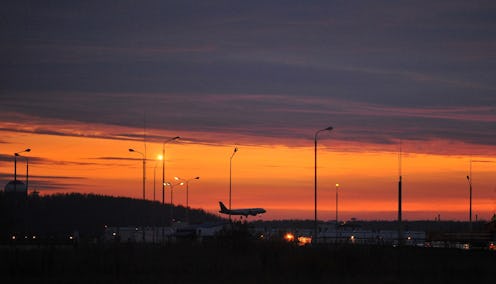Russia's Kogalymavia airline, also known as Metrojet, has only had two major accidents in its 22 years of operation. The second was this past Saturday, when an Airbus A321 traveling from Sharm el-Sheikh, Egypt, to St. Petersburg, Russia, crashed in the Sinai Peninsula. All 224 people on board Kogalymavia Flight 9268 were killed. Most of the passengers were Russian nationals who were tourists returning from Egypt. Russian President Vladimir Putin ordered an investigation into why the plane crashed and also declared Nov. 1 a national day of mourning to remember those lost. Kogalymavia airline's other major accident, which killed three passengers and injured dozens more, took place in January 2011, when a fire started on a Tupolev Tu-154B-2 jet operated by the airline.
In 2011, the Tupolev jet burst into flames while taxing on the runway, before it even took off. The plane, Kolavia Flight 348 (the airline rebranded as Metrojet in 2012), was set to fly a domestic route from Surgut to Moscow when the fire began. The fire started in one of the plane's engines and broke out near the rear fuselage. The flames eventually caused an explosion, which filled the cabin with black smoke and led to a rapid emergency evacuation. The blast spread flames more than 1,000 square feet, according to BBC News.
At the time of the 2011 Tupolev jet fire, a passenger told BBC News that people were "literally stepping on each other's heads" to escape the flames. Three people died in the eruption, and another 43 people were injured. The jet had been carrying 124 people, and a majority of the passengers were able to evacuate before the plane exploded. While the incident may have been Metrojet's only other major accident, the same isn't true for the Tupolev model. A different Tupolev model, the Tupolev Tu-95 bomber, also caught fire on a runway during an August 2015 military training session in Russia's Amur region. That fire injured five Russian soldiers and forced the country to ground the line of planes.
While authorities have not figured out the exact reason for Saturday's crash, technical failures seem like the most likely option. Kogalymavia has repeatedly defended the plane's pilot, Valery Nemov, who had more than 12,000 hours of flying experience, and other officials have agreed that human error is unlikely. Many people have also discredited ISIS' claim that it caused the attack in retaliation for Russian airstrikes in Syria. Whatever may have caused Saturday's tragedy, authorities are looking into a number of possibilities. Not only will it help them understand the event, but they can also help make sure there won't be a third incident for Kogalymavia airline.
